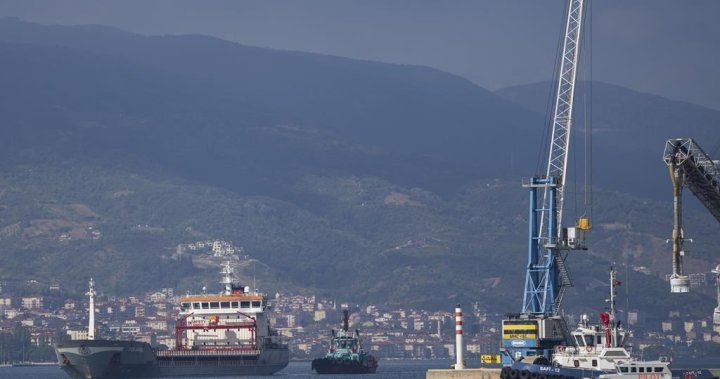
Russia is suspending the Ukraine grain deal. What that could mean for food prices
Global News
Here is what Russia's decision could mean for a world increasingly worried about food security and high food prices:
Russia has suspended its part of the deal allowing Ukraine to ship grain from its Black Sea ports safely amid a monthslong war, and it appears that the remaining partners are now left to take their chances.
On Monday, Ukraine said a dozen ships had sailed despite initially reporting that more than 200 vessels, many loaded and ready to travel, were stuck after Russia’s weekend announcement. Such exports are crucial: Ukraine and Russia are key global suppliers of wheat, barley, sunflower oil and other food to countries in Africa, the Middle East and parts of Asia where many are already struggling with hunger.
It’s not immediately clear who would take the risk of sailing from Ukraine without Russia’s protection after Moscow alleged a Ukrainian drone attack against its Black Sea fleet. Kremlin spokesman Dmitry Peskov said implementing the grain deal is “hardly feasible” in a situation when “Russia talks about the impossibility of guaranteeing the safety of navigation in the mentioned areas.”
Here is what Russia’s decision could mean for a world increasingly worried about food security and high food prices:
The grain initiative has been a rare example of cooperation between Ukraine and Russia since Russia’s invasion in February. Brokered by the United Nations and Turkey, it has allowed more than 9 million tons of grain in 397 ships to safely leave Ukrainian ports. The grain agreement has brought down global food prices about 15 per cent from their peak in March, according to the U.N., and the U.N. secretary-general had urged Russia and Ukraine to renew the deal when it expires Nov. 19.
Following Russia’s announcement, wheat futures prices jumped more than five per cent on Monday in Chicago, while key oil futures prices rose in Asian markets. With global markets tight, prices will rise and poorer countries will have to pay more to import grain, said Joseph Glauber, senior research fellow at the International Food Policy Research Institute in Washington.
Before the grain deal was brokered, the U.S. and Europe accused Russia of starving vulnerable parts of the world by denying exports. Since the deal, Russian President Vladimir Putin has alleged that most of the exported grain was going to Europe instead of the world’s hungriest nations.
The U.N. Conference on Trade and Development, however, said in a report published last week that wheat is mostly going to poorer countries, with nearly 20 per cent of exported wheat going to the least developed nations.





